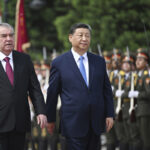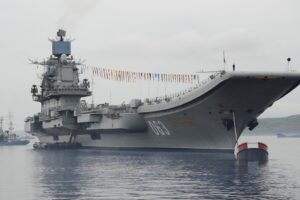Washington: One of America’s biggest proponents of the AUKUS deal has welcomed Australia’s plans to underwrite the expansion of the alliance’s naval capability as part of the “most important security partnership” the US has entered into in decades.
Congressman Joe Courtney, co-chair of the so-called “AUKUS caucus” in Washington, also has suggested that builders from Connecticut and Virginia, the two states where nuclear submarines are currently built, could end up being deployed to Australia to ensure the plan becomes a reality.

According to leaks to multiple international media outlets this week, Australia will purchase up to five US Virginia-class boats as a stop-gap measure before acquiring a fleet of British-designed attack boats that will incorporate American technology and are expected to be built in Adelaide.
“There’s going to be a lot of hard work on Australia’s side,” he told The Age/Sydney Morning Herald, referring to the challenge of finding the workforce to bring the ships to service.
“I suspect you’re going to be seeing some shipbuilders from Groton, Connecticut, and Newport News, Virginia, shuttling back and forth as that undertaking grows.”
Virginia-class nuclear subs are built by two companies: GD Electric Boat in Connecticut and Huntington Ingalls Industries in Newport News, Virginia. The US Navy has a target of two subs to be built a year but COVID-era supply chain bottlenecks and workforce disruption have slowed production, fuelling concerns the AUKUS pact could overstretch the industrial capacity of US shipyards even further.
Such concerns were outlined by two senators, who have explicitly warned against any plan to sell or transfer Virginia-class submarines to Australia before the US Navy meets its current requirements.
However, Courtney rejected the notion that America’s industrial base couldn’t cope, arguing that the budget signed into law in December included the biggest recurring investment in job training, supply chain development, and expansion of shipyard facilities he has witnessed in his time in Congress. In its annual update last week, Electric Boat also revealed it had hired 3700 new workers last year and was seeking to recruit a further 5700 employees this year.
“As long as you have that consistent recurring investment in the submarine industrial base then we can build more.”
Courtney, who has branded AUKUS “the most important security partnership that America has entered into in decades,” said Australia would require America’s ongoing help to ramp up the shipyard in Adelaide.
The Congressman, who is also the second-highest ranking Democrat on the House Armed Services Committee, later tweeted that the deal was great for submarine production for the US Navy as well as AUKUS, for American shipbuilders and “the nationwide supply chain that supports them”.
The congressman’s comments come after Australian Defence Minister and Deputy Prime Minister Richard Marles admitted in Washington that building up an AUKUS-ready nuclear workforce was “one of the real challenges that we face and we’re going to have to do a lot of work to get this right”.
Others have also raised concerns about the workforce capacity. Charles Edel, the Australian chair for the Centre of Strategic and International Studies said that “for AUKUS to succeed, it really needs to increase the industrial capacity of the United States, Britain, and, eventually, Australia as well”.
The secretly brokered AUKUS deal included the Australian government’s cancellation of a $90 billion contract for a French-built fleet of conventional submarines, which sparked a diplomatic row within the Western alliance that took months to mend.
The European official said France had been briefed on the terms of the purchase agreement. US President Joe Biden spoke with French President Emmanuel Macron on Tuesday, the White House said, adding that they “discussed the cooperation between the United States and France in the Indo-Pacific region.”
The AUKUS deal is a key element as the US attempts to counter China’s own growing military and economic might.
The Biden administration on Thursday (Friday AEDT) asked for billions more dollars to boost its Indo-Pacific military command, enhance missile defence and strengthen regional economies, as part of the broader push to counter China’s more assertive role in the region.
The White House is proposing $US9.1 billion ($13.8 billion) for Pentagon investments in the Indo-Pacific region as part of the Pacific Deterrence Initiative, up from the current $US6.1 billion.
Separately, the Indo-Pacific Command this week said it wanted $6 billion extra to boost its arsenal for a potential fight with underwater mines nicknamed Hammerhead and Quick Strike and ground-launched Tomahawk cruise missiles that could be fired by the army and marines against Chinese ships.
Source: WA Today
















